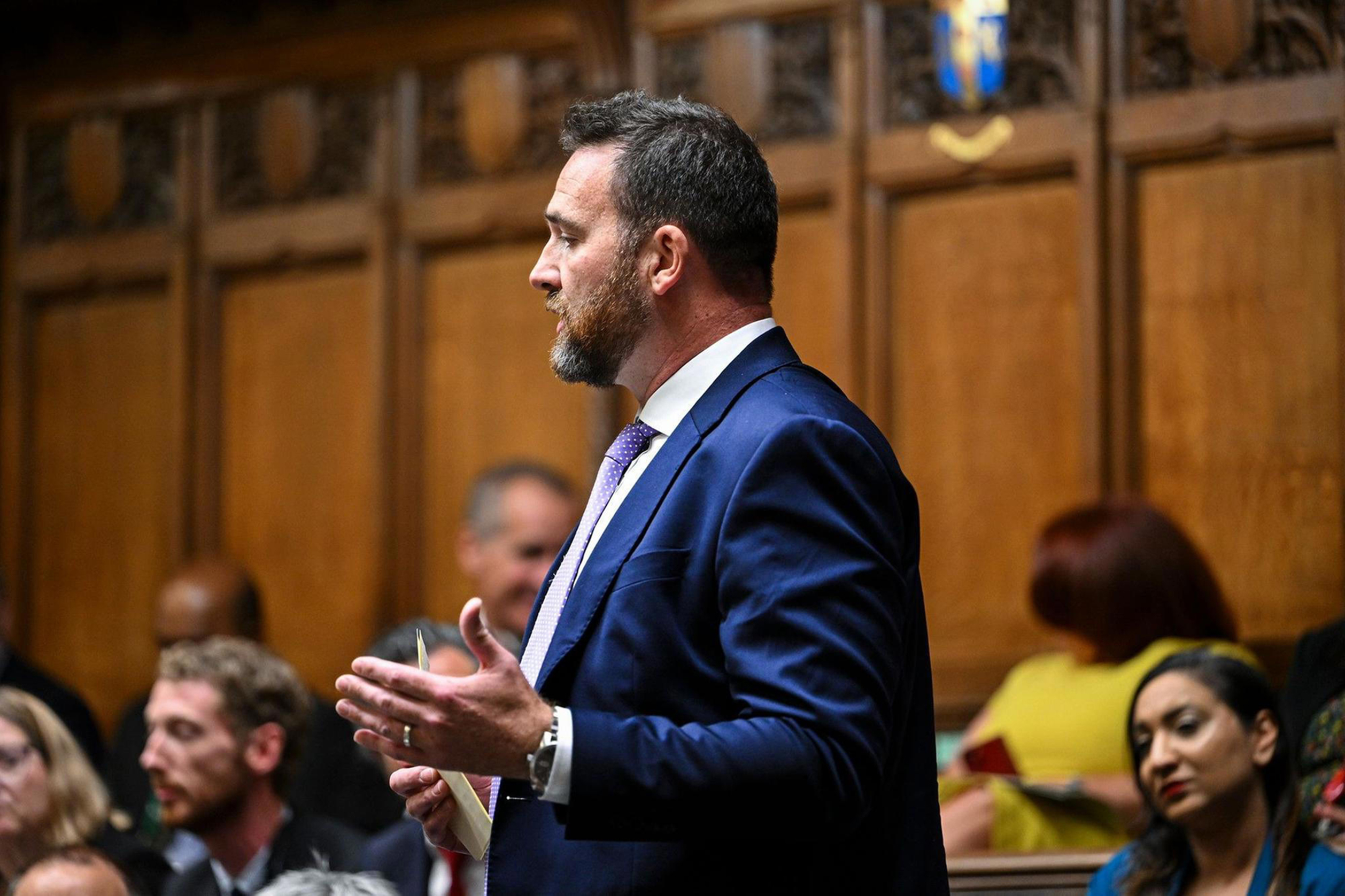Gregor Poynton: I won't shy away from criticising Elon Musk
It’s been nine months since Gregor Poynton took the Livingston constituency with a 40.9 per cent share of the vote and the excitement sparked by the July election result has still not worn off. “I shouldn’t maybe admit this, but I’m still learning all the names of them [the 650 MPs]”, he laughs.
“I never imagined I would get a job in politics, far less become an MP,” he adds. Indeed, beside an unsuccesful attempt at the age of 21 to represent North East Fife at the 2003 Scottish Parliament election “to get a taste of it”, his role in politics has largely played out behind the scenes.
Persuaded by a family friend to join the Labour Party while studying politics at the University of Strathclyde, he soon found himself interning for then Labour MEP Catherine Stihler and, as he puts it, “one thing led to another”. He then went on to manage campaigns and political strategy teams, before finally ending up in the House of Commons.
But Poynton’s track record goes beyond political manoeuvring. Early in his career he became captivated by the power of technology off the back of his involvement in the digital campaign for former US president Barack Obama during the 2008 election. Drawn by technology’s power “to engage people, inspire them, and then actually put them to action”, he joined campaign strategists Blue State Digital, where he eventually took on the role of UK political director. He later became a partner at Portland Communications where he led a team of digital experts including video producers and web developers.
However, since then, his view on letting tech run wild has changed. “I’m very much still sort of pro technology, how we use technology in our public services and now in driving our economy. But we need to do that in a proportionate and correct way.”
Behavioural issues in Scotland’s schools have been boiling over in recent years, with teachers, parents, and pupils crying out for action
Now his days are filled with pressing questions on the dangers posed by online threats, whether at work or at home. In January he was selected to take on one of the most critical roles of the moment: chair of the All-Party Parliamentary Group (APPG) on Children’s Online Safety. And when he’s off the clock, his full attention shifts to his sons Lachlan, who is five, and Ruairidh, two.
 Poynton giving his backing for the government’s welfare reforms in the Commons
Poynton giving his backing for the government’s welfare reforms in the Commons
Although his children are still young, he tells Holyrood that discussions on when to give their eldest a phone have already taken over the parents’ group chat. Indeed, research from Ofcom reveals that a quarter of UK children aged five to seven already own a smartphone, while half of those under the age of 13 are on social media.
Poynton tells Holyrood: “Ultimately phones and technology are going to be and are part of their lives. And you can’t put that back in a box, nor would you necessarily want to. They’ll need it for their working lives. Almost certainly, no matter what they do, they’ll need some digital literacy. They’ll need it for their personal lives, as more and more public and private services are accessible online, so people need to be comfortable and familiar with how to use it… So that’s all to the good, but how is that proportionate?”
Devising appropriate regulation and support for children and parents is going to be a “big issue” for parliament, Poynton says. He is keen to see a ban on phones in schools become law, describing the current guidance as a “waffle”.
They’re [Reform] a sort of an undefined bucket for frustration
“Behavioural issues in Scotland’s schools have been boiling over in recent years, with teachers, parents, and pupils crying out for action,” he says. “Schools should be places free of and protected from violent and aggressive behaviour and a mobile phone ban I believe would benefit everyone.”
Currently, neither Holyrood or Westminster has enforced a complete ban. The UK Government issued advice in October on how schools should stop the use of phones, while last summer the Scottish Government published guidance empowering headteachers to ban mobile phones in schools, claiming it did not consider a national ban “appropriate or feasible”. However Scottish Labour leader Anas Sarwar has since pledged to ban phones in schools if he becomes the next first minister.
Poynton continues: “I think as a government, we need to take action and say, ‘well, actually, we don’t think it’s a good idea to have them in and around schools and we want to make sure that that is clear for teachers, for parents, to help manage that too’.”
He took on the role of APPG chairman amid an online child safety crisis. Research by the Edinburgh-based Childlight Global Child Safety Institute revealed more than 300 million children a year are victims of online sexual exploitation and abuse, and that more than 150,000 children in Scotland were likely to have been sexually abused online in the past year.
“It is a hard job, and so that [content] does somewhat stick with me”, Poynton says. I ask him if the Online Safety Act goes far enough, noting it has come under fire from high-profile campaigners for not being fit for purpose. “There’s some areas where I think that probably Ofcom should go faster”, he admits. He points to the watchdog’s responsibility to oversee app age verification systems, arguing that it is missing key opportunities to enforce stricter measures. “Apple and Google have a huge amount of data already on their customers. But if you’re one of those apps [and] someone just downloads your app, you don’t know [who they are] until they start filling in a form to tell you who they are.
“Apple and Google should look at whether, when someone downloads an app that is for 18 and over...could they flag that that person might be under 18? Therefore, they could then get sent on a different journey for age verification, which is perhaps longer and more in-depth. So, there’s areas like that, but I believe they’re [Ofcom] not going to look at that for some time in terms of surveying whether that will be impactful.”
Will he let his sons use social media before they turn 16? He leaves no room for hesitation: “Absolutely not... So, that’s a fight I’m without a doubt going to have.”
But Poynton seems to be an outlier within his party on the matter. Earlier this year technology secretary Peter Kyle said he had no plans to introduce a ban, pivoting away from previous remarks that the measures were “on the table” in a move which has also recently been shown to be against young people’s wishes, with seven in 10 agreeing that social media should be banned for those under the age of 16.
On the international stage, Poynton is navigating a battle with powerful tech giants on what is considered “free speech” – most notably X owner Elon Musk, to whom he has already had to stand up. In January, he wrote to the tech mogul demanding him to remove a video linked to the Southport attacks from his social media platform. In his letter, Poynton warned Musk that if he failed to do so, he would face significant “legislative consequences” in the UK. The video has been geo-blocked in Australia but remains available elsewhere.
“On this, I wouldn’t shy away from criticising him”, Poynton tells Holyrood. “It just seems to me completely and utterly unbelievable. It doesn’t seem to me to be a question of free speech, or a sort of edge case or a slightly grey area, that seems to me to be a black and white case, and people should not be able to access that video.”
Ultimately phones and technology are going to be and are part of [kids] lives. And you can’t put that back in a box, nor would you necessarily want to
I ask him if Musk’s critical view of online safety laws will impact UK-US relationship. He says the relationship “is much broader than one multi-billionaire” but adds it “remains to be seen.”
It’s been a hard year for Scottish Labour so far, following its dip in popularity since Keir Starmer took over as prime minister. In January, a Survation poll placed the party 13 and 10 points behind the SNP on the constituency and list vote respectively. And three weeks after its annual conference, new figures showed it had made little progress in the polls, still standing 11 and nine points behind the SNP.
“I don’t think it’s [2026 Holyrood election] going to be easy”, Poynton admits. However, citing the current SNP government’s record on health and public funding, he is “confident” that when the time comes “we’ll begin to see people think it’s time for a change with Labour”.
However, he makes no secret of it – 2026 will be won or lost on unity, admitting his party hasn’t always been on the same page. “I think the new culture we hope as Scottish Labour MPs to create is one of a Team Scottish Labour… I think having that dynamic of Scottish Labour MPs and Scottish Labour MSPs working together as one team, well it’s not necessarily to criticise the past, but I think it isn’t the way it probably was in the past. And I think as a Scottish Labour MP, I feel a real sense of political responsibility to help support us win in 2026. And in the past I think MPs thought the Westminster election was their responsibility [and] MSPs thought the Holyrood elections were their responsibility.”
 Poynton with Sarwar and deputy prime minister Angela Rayner the campaign trail in Livingston | Image credit: Alamy
Poynton with Sarwar and deputy prime minister Angela Rayner the campaign trail in Livingston | Image credit: Alamy
However, Poynton is familiar with challenging electoral situations. In 2015 he worked under Jim Murphy during his brief spell as Scottish Labour leader. During Murphy’s six-month tenure, the party got one of its worse results at a UK level, losing 40 seats at that year’s general election.
“2015 was a difficult election, there’s no doubt about that… I mean, after 2014 politics in Scotland changed around a sort of Yes/No dividing line. And 45 per cent of the vote gets you nowhere near winning a referendum but if you get 45 per cent of the vote in a four-party system, first-past-the-post-system, you absolutely run the table which is obviously what happened with the SNP. They were able to coalesce a sort of yes vote around the no vote, which was split between ourselves, Conservatives and Liberal Democrats,” he says.
However, he insists independence isn’t “uppermost” in people’s minds any more, citing his experience campaigning for the July election.
“I had huge numbers of people say to me [that] if there was a referendum tomorrow, they would still vote yes, but they don’t think there’s going to be, and actually they don’t want there to be, because they wanted a government that was going to focus on growing the economy [and] get money and investment into our NHS...”
Poynton also recognises the Reform UK threat is “real” but predicts the party’s unclear policies will ultimately lead to their downfall north of the border.
“At the moment, they’re a sort of an undefined bucket for frustration…[but] I think, as we get closer to 2026, they’ll have to lay out what their view will be, and I think people will begin to see that they don’t actually have the answers to the big questions that will be facing the country in 2026.”
Holyrood Newsletters
Holyrood provides comprehensive coverage of Scottish politics, offering award-winning reporting and analysis: Subscribe